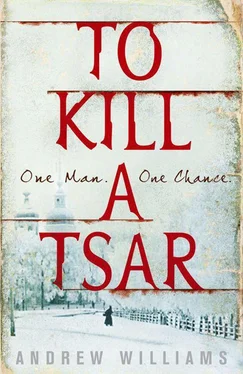‘And now there is talk of famine in the south. It is quite medieval.’
Mary Glen leant forward to touch his hand sympathetically.
‘Oh, Freddie, it’s awful.’ Alexandra’s voice shook a little with emotion. ‘And they say a man has died of plague in Petersburg. Could it really happen here?’
‘Of course not, dear,’ said her mother briskly, ‘we live in a modern city.’
Then there was talk of Hadfield’s mother in London. Perhaps she could be persuaded to visit her old home? Sarah Somerville had left St Petersburg eighteen years ago with a new husband and her son and never returned. Frederick had been eleven when his father died of consumption and twelve when his mother married again. His stepfather was an engineer and entrepreneur, successfully exploiting the new fashion for electric lighting in public buildings and country houses. James Somerville was too wrapped up in his work to take any interest in his stepson and, after the first years of their marriage, he showed precious little more in his wife. Frederick’s mother had channelled her loneliness and frustration into her son’s upbringing. They spoke only Russian to each other, and during the long vacations at Cambridge he had visited his uncle, and twice more as a student at the University of Zurich. There had never been any question of him doing anything but follow his father into the medical profession, and his mother was delighted when, after two unhappy years in London, he had announced he was returning to the city of his birth. Hadfield was still finding his feet, but thanks in no small part to his uncle’s patronage he had been offered a good post at the Nikolaevsky Hospital.
‘You will come to dinner? Your uncle must hear of your work in Astrakhan.’
‘Yes. Thank you.’ He could hardly refuse.
‘You should tell him everything. He may be able to help in some way.’
Hadfield was touched by his aunt’s concern, but sceptical nonetheless. The general would listen to an account of the hardship his nephew witnessed with a polite show of concern. It would then be followed by a hectoring defence of the government of which he was a member. Hadfield had learnt to avoid conversation that might loosely be described as ‘political’ in his uncle’s house.
Hadfield spent the afternoon on the wards at the Nikolaevsky, then at five he took a droshky back to his apartment to change. Frock coat, top hat, patent leather shoes and his father’s silk waistcoat, for his uncle would expect nothing less formal even when only the family was to dine.
It was a cheerless dining room in dark stained oak, and on either side of the large carved mantel hung very ordinary Belgian tapestries of a nobleman and his entourage hunting with dogs. Two new gas chandeliers in the Russian style were shedding indiscriminate pools of dirty yellow light, the dining table caught in the gloom between. Heavy baronial chairs of oak and red Moroccan leather with a shield and crest carefully painted on the scroll at the top were set around the walls. General Charles Glen was the first in his family who had felt the need to bear arms. He was sitting now at the head of the table, his large hands gripping the chair as if squeezing life from a serpent: ‘Can you imagine a man like that responsible for shaping the minds of the young?’ he snorted in disbelief. ‘Can you?’
‘Can I what, General?’ asked his wife at the other end of the dining table.
‘Can you imagine this man — Soloviev… you know, he was a teacher for a time?’
A footman stepped forward to serve the general a consommé from a brash silver tureen.
‘The trial is a formality, of course, the fellow will be hanged.’
Hadfield was sitting on his uncle’s right, with his cousin across the table from him. Behind her and between the windows opposite there was a full length martial portrait of the first General Glen, who had left Scotland to serve the Empress Catherine. The artist had caught him in middle age, his long red hair and cavalry moustache tinged with grey, his face a little fleshy. His grandson — the third General Glen — was sixty-five and entirely grey, but in all other respects the resemblance was striking: the same dark blue eyes and regular features, the same china white skin and Cupid’s bow mouth and the same nakedly belligerent spirit.
‘This year there’s been an attempt on the life of General Drenteln, the murder of Prince Kropotkin in Kharkov — countless smaller outrages — and it’s only April. A clever chap from the Justice Ministry has been given the task of tracking these nihilists down. The time has come to crack down hard. What do you say, Frederick?’
Hadfield dabbed at his lips with his napkin while he tried to frame a diplomatic answer. This was the sort of question he hoped to avoid.
‘Please, Father, that is quite enough talk of murder. Your soup is going cold.’
Hadfield glanced across at Alexandra and she gave him a knowing smile.
‘I’ve had enough,’ said the general with a wave of his hand. The footmen cleared away the dishes then served a baked pike cooked à la Russe with potatoes and sour cream. For a time the conversation was of a general nature with talk of the theatre and the new production of Roxana at the Mariinsky. A well known prince had lost a great deal of money at cards; there were rumours of a new electric tram for the city, and Sophie Gordon, the heiress to a small fortune in manufacturing, was to have her dearest wish: she was betrothed to a noble at last, a poor count with an estate near Tula. And the general had visited the new British ambassador and his wife.
‘Lord Dufferin is a man of great experience and integrity. Prince Gortchakov and I were with him when he was presented at court. He made a very favourable impression on His Majesty.’
‘You know, you must introduce Frederick, my dear,’ said his wife.
‘Yes, Father, you must!’ Alexandra leant forward to touch her father’s sleeve. ‘The ambassador won’t want a German doctor.’
‘And Frederick is wonderfully well qualified,’ said his aunt, turning to smile at him. ‘Cambridge, London, Zurich…’
The general picked up his wine glass and contemplated its contents. ‘I think Frederick would do well not to mention his time in Zurich.’
He took a sip from the glass, then, placing it carefully back, turned his head to stare at his nephew. Hadfield was at a loss to know what to say. His aunt came to his rescue.
‘Not everyone who studies in Switzerland becomes a revolutionary, dear.’
‘They all find shelter there,’ said her husband hotly. ‘Herzen, Bakunin, Kropotkin, and that madman, Nechaev — and now the young woman who tried to murder the governor general of the city — free to come and go as they please.’
‘I am sure Frederick didn’t move in those circles.’
His aunt’s unspoken ‘Did you?’ hung in the air. For a few seconds there was an embarrassed silence at the table.
‘No. No.’ Hadfield was conscious he sounded flustered. ‘No. I was too busy. Too busy enjoying myself to care about politics.’
The general gave a short conspiratorial laugh then leant forward a little and touched his hand: ‘But it’s not politics, Frederick. As Prince Metternich said, “Freedom cannot exist without order.” These people want to plunge us into anarchy. They want to force a revolution on us. Who do they speak for? Nobody.’
‘I haven’t been in Russia long enough to say,’ Hadfield ventured, ‘but I know there are reasonable people who would like to see peaceful change and some form of democracy.’
‘Well, I can’t understand why so many of them come from very good families,’ complained his aunt.
The general smiled patronisingly at his wife then turned back to his nephew: ‘Only order and firm government will hold this country together. This is not Great Britain. The emperor and the Church are the only authority the people recognise here. Change, yes, but gradual change.’ He leant a little closer and said with hard emphasis, as if throwing down a challenge: ‘Take it from me. It’s the only way.’
Читать дальше












